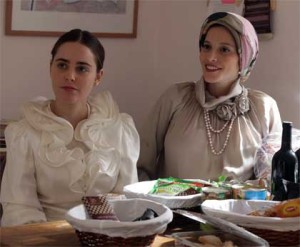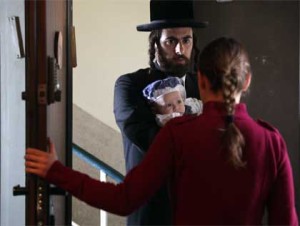Film (2012)
Written and Directed by Rama Burshtein
Produced by Assaf Amir, Original Music by Yitzhak Azulay, Cinematography by Asaf Sudri, Film Editing by Sharon Elovic, Casting by Michal Koren, Art Direction by Uri Aminov, Costume Design by Hani Gurevitch
With Hadas Yaron (Shira), Yiftach Klein (Yochay), Irit Sheleg (Rivka), Chayim Sharir (Aharon), Razia Israeli (Aunt Hanna), Hila Feldman (Frieda), Renana Raz (Esther), Yael Tal (Shifi), Michael David Weigl (Shtreicher), Ido Samuel (Yossi), Neta Moran (Bilha), Melech Thal (Rabbi)

Renana Raz as Esther
in “Fill the Void”
Photo by Karin Bar
Courtesy of Sony Pictures Classics
In a community in which marriage is of prime importance, particularly to a young woman, Shira, an eighteen year old in an Orthodox Hasidic family, has been looking forward to a match with a young man who she has seen but barely knows. In such communities, families and matchmakers as well as potential spouses join in complex negotiations and arguments about what is an appropriate liaison. Shira’s expected plans face some alteration given changes in her family, and the challenges that arise test her judgment and sensibilities as she moves from girlhood to adulthood.
What an interesting, anthropological study of this neck of the universe this is, and how interestingly, and at times, beautifully, done.
It is not so easy to make a contemporary film about such an austere and isolated community that appeals to a broader audience, but Rama Burshtein, the director, has done an excellent job of bringing us inside. It is odd for a modern urbane secularist to watch a contemporary drama about the sole importance of marriage options for a young woman; but, in this Hasidic universe captured through Burshtein’s eyes, this pressurized world of marital alternatives, though unbearably small and restricted to the view of outsiders, gains its own force and range.
It is odd here how passion shows itself. And when it does, how strangely and secretively it emerges from the constraints of the world it inhabits. The moral rigors that pervade that world are apparent at every turn, as is the attendant constriction of sensibility and guilt that go along with that. But, as a result, the qualities of intelligence, openness of character, and emotional availability emerge that much more in relief.
Plagued by the harangues and manipulations of various elders, Shira hovers on the edges of her own realization while, at the same time, trying to honor the roles she is expected to fulfill. How to balance those, and how to judge wisely among them, is her challenge, and Hadas Yaron, as Shira, conveys that emergence into reflective consideration, rather than formulaic adherence, with subtlety of expressive demeanor.

Hadas Yaron as Shira
in “Fill the Void”
Photo by Karin Bar
Courtesy of Sony Pictures Classics
Yiftach Klein as Yochay has a magnetic charm that radiates through his payes and black garb. If there could be a Hasidic matinee idol, he would be it. Somehow the tragic grace and attendant vulnerability of his stance gives him an appeal that is unexpected. Renana Raz, as his wife and Shira’s sister, Esther, has a graceful radiance that shines beneath her fully wrapped head covering. When Yochay calls her “my Torah,” there is incredible passionate warmth between them.
The full set of characters here – parents, rabbis, matchmakers, old maids – creates a small universe that is fascinating as well as heartrending.
Some years back, Lis Harris, then a reporter for The New Yorker, did a series of articles on a Hasidic community in Brooklyn that eventually was compiled into a book called Holy Days. It is a moving portrait of a community for which Harris gained great appreciation, and which she conveyed movingly in her account.
Similarly, in Fill The Void, Burshtein has created a beautiful portrait of a religious community, giving a sense of depth to its nuances, and a feeling for how the transition from adolescence into adulthood takes its own distinct form within it.
– BADMan
Leave a Reply